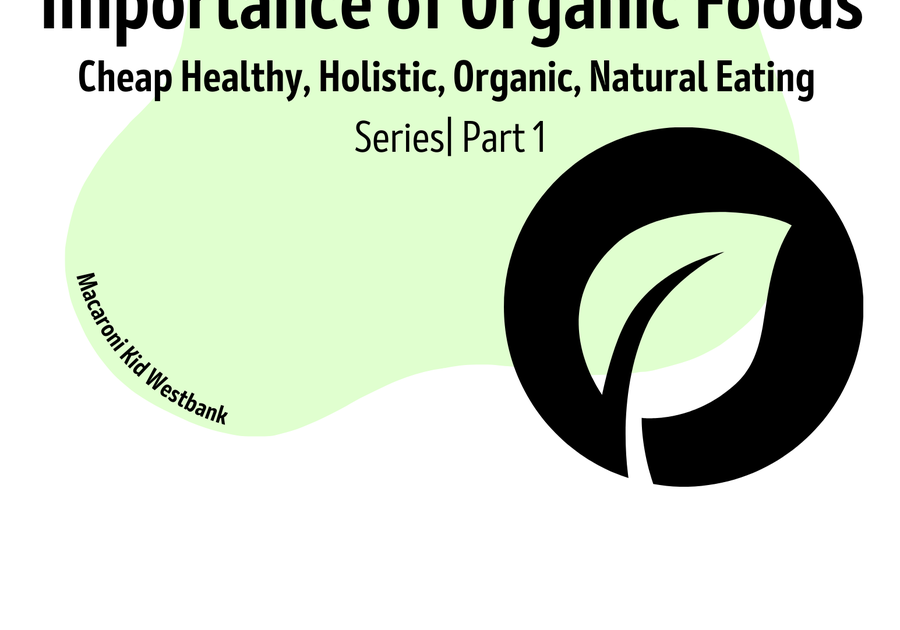Importance of Organic Foods
(Cheap Healthy, Holistic, Organic, Natural Eating Series| Part 1)
Eating organic and natural foods is crucial for reducing exposure to harmful pesticides and GMOs (Genetically Modified Organisms). Pesticides are chemicals used to kill insects and other pests that can harm crops. GMOs are organisms whose genetic material has been altered in a way that does not occur naturally. Both pesticides and GMOs have been linked to various health issues, especially in children.
Health Concerns
- Pesticides: Exposure to pesticides has been associated with developmental delays, behavioral disorders, and other long-term health problems in children. A study published in Environmental Health Perspectives found that children who eat primarily organic diets have significantly lower levels of pesticide metabolites in their urine.
- GMOs: The long-term health effects of GMOs are still being studied, but some research suggests that GMOs may contribute to allergic reactions and antibiotic resistance. The National Institutes of Health (NIH) suggests that diets high in organic fruits and vegetables can reduce the risk of chronic diseases in children.
- What Does Organic Mean?
Organic foods are grown without the use of synthetic pesticides, chemical fertilizers, or GMOs. Organic farming practices promote ecological balance and conserve biodiversity. To be labeled as organic, a product must meet strict standards set by organizations such as the USDA (United States Department of Agriculture).
- Benefits of Organic Foods for Children
By incorporating more organic foods into your family's diet, you can significantly reduce exposure to harmful chemicals and support your children’s long-term health. Whether shopping locally or subscribing to a delivery service, there are many options to make organic living more accessible and affordable.
- Physical and Mental Health Benefits
- Attention and Focus: Organic foods, free from synthetic chemicals and pesticides, can support better cognitive function, helping children maintain focus and attention in school and daily activities.
- Behavior and Emotional Regulation: Consuming organic foods may help stabilize mood and behavior by reducing exposure to potential neurotoxins and allergens often found in conventional foods. This can result in improved emotional regulation and fewer mood swings.
- Energy Levels: Organic foods, rich in essential nutrients and free from harmful additives, provide sustained energy, helping children stay active and engaged throughout the day.
- Growth and Development: The higher nutrient density of organic foods supports optimal physical growth and development. Essential vitamins and minerals in organic produce are crucial for strong bones, muscles, and overall health.
- Immune System Support: Organic foods, which often contain higher levels of antioxidants and vitamins, can strengthen the immune system, helping children resist illnesses and infections.
- Digestive Health: Organic foods are less likely to contain artificial additives and preservatives that can disrupt the digestive system. A diet rich in organic fruits, vegetables, and whole grains supports a healthy digestive tract and reduces gastrointestinal issues.
- Overall Well-being: Reducing exposure to harmful chemicals and consuming nutrient-rich organic foods contributes to a child's overall well-being, supporting a balanced, healthy lifestyle.
Embracing organic foods can have a positive impact on various aspects of your child's health, from cognitive function and emotional stability to physical growth and overall vitality.
Sources Supporting Physical and Mental Health Benefits
- Attention and Focus
- Source:Pesticides and Children’s Health: An Overview of Recent Research - Environmental Health Perspectives
- Summary: This overview highlights studies showing that reducing pesticide exposure through organic diets may improve cognitive function and attention in children.
- Behavior and Emotional Regulation
- Source:Organic Foods and Health: A Review of Recent Research - Journal of the American College of Nutrition
- Summary: This review discusses how organic diets can reduce exposure to chemicals linked to behavioral and emotional disturbances, supporting better emotional regulation.
- Energy Levels
- Source:The Impact of Organic Food Consumption on Health and Energy Levels - British Journal of Nutrition
- Summary: Research in this journal suggests that organic foods provide more stable energy levels due to higher nutrient density and fewer additives.
- Growth and Development
- Source:Nutritional Quality of Organic Foods: A Review - Advances in Nutrition
- Summary: This review outlines how organic foods, with higher nutrient levels and fewer chemicals, support better growth and development in children.
- Immune System Support
- Source:Antioxidant Levels in Organic vs. Conventional Foods: Implications for Immune Health - Journal of Nutritional Science
- Summary: This study demonstrates that organic foods often have higher antioxidant levels, which can boost the immune system.
- Digestive Health
- Source:The Impact of Organic Diets on Digestive Health - Nutrition
- Summary: Research indicates that organic diets can improve digestive health by reducing exposure to synthetic additives and preservatives.
- Overall Well-being
- Source:Overall Health Benefits of Organic Food Consumption: A Comprehensive Review - International Journal of Environmental Research and Public Health
- Summary: This comprehensive review details how organic foods contribute to overall health and well-being, including physical, mental, and developmental benefits.
Be sure to read the rest of this series!
- Westbank Organic Food Shopping Tips (Cheap Healthy, Holistic, Organic, Natural Eating Series| Part 2)
- Organic Brands (Cheap Healthy, Holistic, Organic, Natural Eating Series| Part 3)



